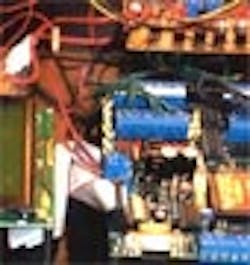The 3 A.M. Mindset
Another October, another ISA conference; more fajitas, fewer people.
Granted the ‘less-filling’ feeling might have come from the economic issues that surround our world, but there is or was also a sense of a once-powerful show and conference being adrift and rudderless.
The 40th anniversary of the PLC was a theme that Schneider Electric and ISA used to draw people into a history booth that had pictures and patents that conjured up visions of a hungover Dick Morley writing the specification for the first PLC.
What a time that was. I started in the biz in 1977 as a technical sales rep for Allen-Bradley. I remember stories that I thought were marketing hype—like the original demo of the 084 falling off a dolly into the office of the customer, but still working.
“OK, you guys are really full of it,” I thought. The Modicon people—as I find out now it was Morley himself—wrapped a set of welding cables around the die-cast aluminum chassis and struck an arc. The PLC didn’t even flinch.
No disrespect to A-B’s toys at the time, but the 1774 PLC would have croaked.
Talking to people for the first time about this newfangled control system was interesting, to say the least. Most were intrigued, but most didn’t want to be the first. And I remember the looks I got when I first used the word “computer.” To describe it. Never happened again.
I must have caught the wave because in the first year of customer presentations, I got an order for a blast furnace project at Algoma Steel in Sault Ste. Marie, Ontario.
“Sorry, I had to tell them, “the delivery time is 52 weeks.” That put an end to that. I couldn’t imagine that the demands put on the manufacturing facilities were that heavy.
They seem like simpler days.
The PLC has done a ton of good. The PAC is a hybrid cousin; but, make no mistake about it, the PLC is still in there.
And this is where things are still the same. The Trends and Trails session, organized by Ken Ball at the ISA show had Morley; Bill Fletcher, the original CEO of Modicon; Dr. Kelvin Erickson, author; Terry Divelbiss, a long-time innovator of automation products; and the marketing guy from Schneider Electric.
“We need more skilled automation people,” reminded Divelbiss. “Talk to your local schools and get someone interested, because if we don’t, then we won’t have the skilled help that our new economy will need.”
What I find funny is that for all of the advancements in technology, the automation and control functions have not moved ahead as far as they should have.
Erickson spoke to some comments made about IEC 61131 languages. He talked about the use of structured text and how the maintenance electrician would not be able to interface with it very well.
I couldn’t agree more, but I disagree with the concepts behind the statement. The maintenance electrician shouldn’t have to interface with it. He should be trained well enough in his troubleshooting skills and in the process so that reading code that looks like Pascal is not required. I consider Pascal a computer-based language because now it’s OK to call an automation control system a “computer.” The maintenance electrician also must have the tools to implement, which is what Divelbiss was saying.
Many younger electricians might not have an issue, but a journeyman would.
I asked the panel if we still are designing control systems for the 3 o’clock-in-the-morning mindset? That is to say, I don’t want a phone call to wake me up because someone can’t fix a problem. So I will take the system to their level and everything will be OK.
It seems that still exists and is validated by Erickson’s comments about having to interface structured text.
So the ISA show and conference might be a shadow of its former self, but where can you get a group of people together in one spot and talk geek and philosophy in the same hour. Let’s hope that the ISA show and conference will return to higher ground.


